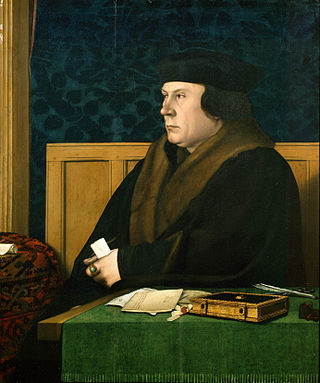
Thomas Cromwell, briefly Earl of Essex, was an English statesman and lawyer who served as chief minister to King Henry VIII from 1534 to 1540, when he was beheaded on orders of the king, who later blamed false charges for the execution.
John Stokesley was an English clergyman who was Bishop of London during the reign of Henry VIII.
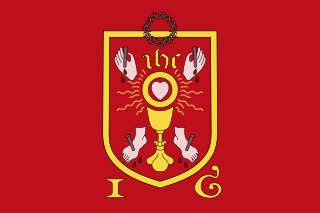
The Pilgrimage of Grace was a popular revolt beginning in Yorkshire in October 1536, before spreading to other parts of Northern England including Cumberland, Northumberland, Durham and north Lancashire, under the leadership of Robert Aske. The "most serious of all Tudor period rebellions", it was a protest against Henry VIII's break with the Catholic Church, the dissolution of the lesser monasteries, and the policies of the King's chief minister, Thomas Cromwell, as well as other specific political, social, and economic grievances.

Diarmaid Ninian John MacCulloch is an English academic and historian, specialising in ecclesiastical history and the history of Christianity. Since 1995, he has been a fellow of St Cross College, Oxford; he was formerly the senior tutor. Since 1997, he has been Professor of the History of the Church at the University of Oxford.

Witch Wood is a 1927 novel by the Scottish author John Buchan that critics have called his masterpiece. The book is set in the Scottish Borders during the Wars of the Three Kingdoms, and combines the author's interests in landscape, 17th century Calvinism, and the fate of Scotland. A significant portion of the dialogue is in Scots.
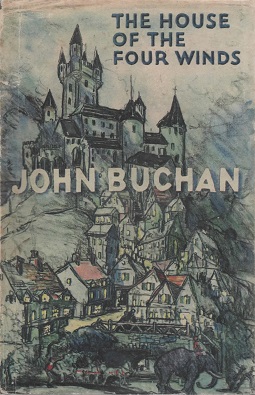
The House of the Four Winds is a 1935 adventure novel by the Scots author John Buchan. It is a Ruritanian romance, and the last of his three Dickson McCunn books. The novel is set in the fictional Central European country of Evallonia and opens two years after the events recounted in Castle Gay.

The Gap in the Curtain is a 1932 borderline science fiction novel by the Scottish author John Buchan. Part of the action is autobiographical, featuring the agonies of a contemporary up-and-coming politician. It explores the theory of serial time put forward by J W Dunne: Buchan had been reading An Experiment with Time.

Huntingtower is a 1922 novel by the Scottish author John Buchan, initially serialised in Popular Magazine between August and September 1921. It is the first of his three Dickson McCunn books, the action taking place in the district of Carrick in Galloway, Scotland.
David John Daniell was an English literary scholar who became Professor of English at University College London. He was founder of the Tyndale Society, a specialist in William Tyndale and his translations of the Bible, and author of a number of studies of the plays of Shakespeare.

Midwinter: Certain travellers in old England is a 1923 historical novel by the Scottish author John Buchan. It is set during the Jacobite rising of 1745, when an army of Scottish highlanders seeking to place Charles Stuart onto the English throne advanced into England as far South as Derby. The Prince, otherwise known as "Bonnie Prince Charlie", the grandson of the ousted King James II, required men and money from English Jacobite sympathisers, and the novel imagines why those were not forthcoming from landowners in the Western counties and Wales. It purports to sheds light on Samuel Johnson's previously unknown activities during that period.

The Half-Hearted is a 1900 novel of romance and adventure by the Scottish author John Buchan. It was Buchan's first novel in a modern setting and was written when he was 24 while working for an All-Souls fellowship and reading for the bar.

The Path of the King is a 1921 novel by the Scottish author John Buchan, presented as a loosely-coupled series of short stories.

Sir Quixote of the Moors: being some account of an episode in the life of the Sieur de Rohaine is an 1895 short novel by the Scottish author John Buchan. It was Buchan's first novel, written when he was nineteen and an undergraduate at Glasgow University. Buchan's original title was Sir Quixote, and he was annoyed by the addition of "of the Moors" by his publisher.

John Burnet of Barns is an 1898 novel by the Scottish author John Buchan, published when he was 23 years of age. His second novel, it had first appeared in serial form in Chambers's Journal earlier that year.

A Lost Lady of Old Years is an 1899 novel by the Scottish author John Buchan. It was first published in serial form in Today. The title comes from Browning’s poem Waring.
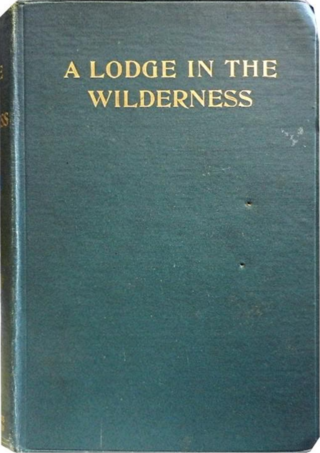
A Lodge in the Wilderness is a 1906 political quasi-novel by the Scottish author John Buchan.

The Free Fishers is a 1934 novel by the Scottish author John Buchan, his last work of historical fiction. The novel is set during the period of the Napoleonic Wars and follows the adventures of Anthony Lammas, a young professor at St Andrews, who is drawn into a plot to kill the prime minister Spencer Perceval. He is aided by The Free Fishers, a secret mutual aid organisation.

Montrose is a 1928 biography of James Graham, 1st Marquess of Montrose by the Scottish author John Buchan. It won the James Tait Black Memorial Prize for biography in 1928.
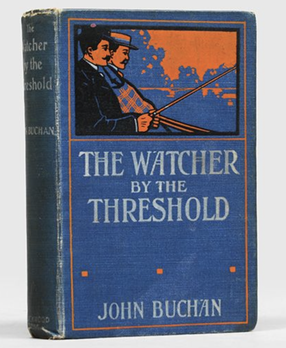
The Watcher by the Threshold, and other tales is a collection of early novellas and stories, most with supernatural elements, by the Scottish author John Buchan. When first published in the UK in 1902 the collection included five stories, mainly set in the Scottish Borders. The collection was republished for the US market in 1918 under the title The Watcher by the Threshold, with four of the original stories and four new ones.

















